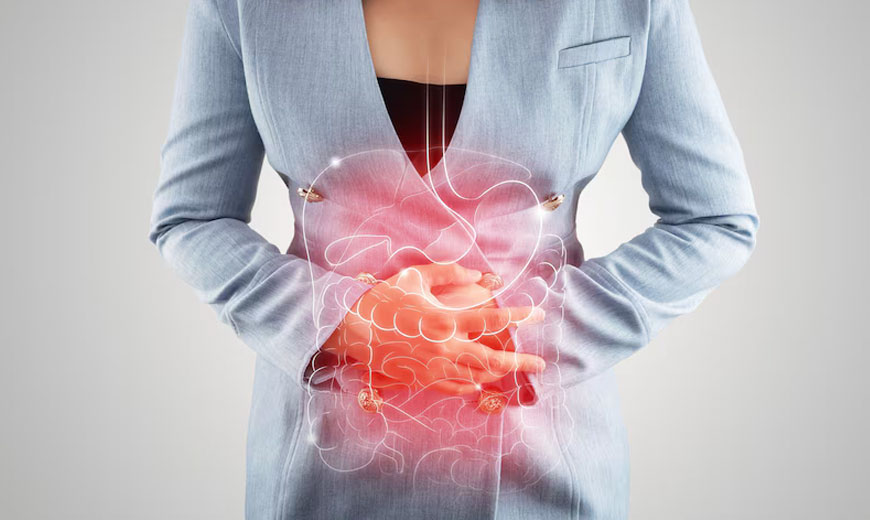Terra Pharmaceuticals

Gastroesophageal Reflux Disease (GERD)
Gastroesophageal reflux disease happens when stomach acid flows back up into the esophagus and causes heartburn. It's often called GERD for short. This backwash is known as acid reflux, and it can irritate the lining of the esophagus.
Many people experience acid reflux now and then. However, when acid reflux happens repeatedly over time, it can cause GERD.
Most people can manage the discomfort of GERD with lifestyle changes and medicines. And though it's uncommon, some may need surgery to help with symptoms.
Symptoms
Common symptoms of GERD include:
- A burning sensation in the chest, often called heartburn. Heartburn usually happens after eating and might be worse at night or while lying down.
- Backwash of food or sour liquid in the throat.
- Upper belly or chest pain.
- Trouble swallowing, called dysphagia.
- Sensation of a lump in the throat.
If you have nighttime acid reflux, you also might experience:
- An ongoing cough.
- Inflammation of the vocal cords, known as laryngitis.
- New or worsening asthma.
Causes
GERD is caused by frequent acid reflux or reflux of nonacidic content from the stomach.
When you swallow, a circular band of muscle around the bottom of the esophagus, called the lower esophageal sphincter, relaxes to allow food and liquid to flow into the stomach. Then the sphincter closes again.
If the sphincter does not relax as is typical or it weakens, stomach acid can flow back into the esophagus. This constant backwash of acid irritates the lining of the esophagus, often causing it to become inflamed.
Risk factors
Conditions that can increase the risk of GERD include:
- Obesity.
- Bulging of the top of the stomach up above the diaphragm, known as a hiatal hernia.
- Pregnancy.
- Connective tissue disorders, such as scleroderma.
- Delayed stomach emptying.
Factors that can aggravate acid reflux include:
- Smoking.
- Eating large meals or eating late at night.
- Eating certain foods, such as fatty or fried foods.
- Drinking certain beverages, such as alcohol or coffee.
- Taking certain medicines, such as aspirin.
Complications
Over time, long-lasting inflammation in the esophagus can cause:
- Inflammation of the tissue in the esophagus, known as esophagitis. Stomach acid can break down tissue in the esophagus. This can cause inflammation, bleeding and sometimes an open sore, called an ulcer. Esophagitis can cause pain and make swallowing difficult.
- Narrowing of the esophagus, called an esophageal stricture. Damage to the lower esophagus from stomach acid causes scar tissue to form. The scar tissue narrows the food pathway, leading to problems with swallowing.
- Precancerous changes to the esophagus, known as Barrett esophagus. Damage from acid can cause changes in the tissue lining the lower esophagus. These changes are associated with an increased risk of esophageal cancer.
Diagnosis
Endoscopy, Ambulatory acid (pH) probe test, X-ray of the upper digestive system, Esophageal manometry, Transnasal esophagoscopy
Treatment
Your doctor is likely to recommend lifestyle changes as the first line of treatment. If you do not experience relief within a few weeks, medication and additional tests may be recommended. Some medication options include:
- Antacids that neutralize stomach acid.
- Medicines to reduce acid production.
- Medicines that block acid production and heal the esophagus.
Functional dyspepsia
Functional dyspepsia is a term used to describe a lingering upset stomach that has no obvious cause. Functional dyspepsia also is called nonulcer dyspepsia.
Functional dyspepsia is common. It is a constant condition, but symptoms don't happen all the time. Symptoms are like those of an ulcer. They include pain or discomfort in the upper belly, bloating, belching and nausea.
Symptoms
Symptoms of functional dyspepsia may include:
- Pain or burning in the stomach, bloating, excessive belching or nausea after eating.
- An early feeling of fullness when eating. The feeling of fullness also is called satiety.
- Stomach pain that happens unrelated to meals or goes away when eating.
Causes
No one knows what causes functional dyspepsia. Medical professionals consider it a functional disorder. That means it can't be explained by a medical condition, so routine testing may not show any problems or causes. As a result, the diagnosis is based on symptoms.
Risk factors
Some factors can increase the risk of functional dyspepsia. They include:
- Being female.
- Using certain pain relievers that are available without a prescription. These include aspirin and ibuprofen (Advil, Motrin IB, others), which can cause stomach problems.
- Smoking.
- Anxiety or depression.
- History of childhood physical or sexual abuse.
- Helicobacter pylori infection.
Diagnosis
A healthcare professional most likely will review symptoms and do a physical exam. Several tests can help find the cause of the discomfort and rule out other disorders. These may include:
Blood tests, Tests for a bacterium called Helicobacter pylori (H. pylori),
Endoscopy.
In some cases, other tests may be done to see how well the stomach empties its contents.
Treatment
Functional dyspepsia that can't be managed with lifestyle changes may need treatment. Treatment depends on symptoms. It may combine medicines and behavior therapy.
Medicines
- Gas remedies
- Medicines to reduce acid production.
- Medicines that block acid "pumps."
- Antibiotics. If tests find H. pylori in the stomach, antibiotics may be prescribed along with acid-suppressing medicine.
- Low-dose antidepressants.
- Prokinetics.
- Medicines to relieve nausea.
Behavior therapy
Gastritis
Gastritis is a general term for a group of conditions with one thing in common: Inflammation of the lining of the stomach. The inflammation of gastritis is most often the result of infection with the same bacterium that causes most stomach ulcers or the regular use of certain pain relievers. Drinking too much alcohol also can contribute to gastritis.
Gastritis may occur suddenly (acute gastritis) or appear slowly over time (chronic gastritis). In some cases, gastritis can lead to ulcers and an increased risk of stomach cancer. For most people, however, gastritis isn't serious and improves quickly with treatment.
Symptoms
Gastritis doesn't always cause symptoms. When it does, the symptoms of gastritis may include:
- Gnawing or burning ache or pain, called indigestion, in your upper belly. This feeling may become either worse or better after eating.
- Nausea.
- Vomiting.
- A feeling of fullness in your upper abdomen after eating.
Causes
Gastritis is an inflammation of the stomach lining. The stomach lining is a mucus-lined barrier that protects the stomach wall. Weaknesses or injury to the barrier allows digestive juices to damage and inflame the stomach lining. Several diseases and conditions can increase the risk of gastritis. These include inflammatory conditions, such as Crohn's disease.
Risk factors
Factors that increase your risk of gastritis include:
- Bacterial (Helicobacter pylori) infection.
- Regular use of pain relievers.
- Older age.
- Excessive alcohol use.
- Stress.
- Cancer treatment.
- Your own body attacking cells in your stomach.
- Other diseases and conditions.
Gastritis may be associated with other medical conditions. These may include HIV/AIDS, Crohn's disease, celiac disease, sarcoidosis and parasitic infections.
Complications
Left untreated, gastritis may lead to stomach ulcers and stomach bleeding. Rarely, some forms of chronic gastritis may increase your risk of stomach cancer. This risk is increased if you have extensive thinning of the stomach lining and changes in the lining's cells.
Diagnosis
Your healthcare professional is likely to suspect gastritis after talking to you about your medical history and performing an exam. However, you also may have one or more of the following tests to find the exact cause.
Tests for H. pylori.
Passing a thin, flexible scope down the throat, called an endoscopy.
X-ray of your upper digestive system.
Treatment
Treatment of gastritis depends on the specific cause. Acute gastritis caused by NSAIDs or alcohol may be relieved by stopping use of those substances.
Medicines used to treat gastritis include:
- Antibiotics to kill H. pylori.
- Medicines that block acid production and promote healing.
- Medicines to reduce acid production.
- Medicines that neutralize stomach acid.
Peptic Ulcers
Peptic ulcers are open sores on the inner lining of the stomach and the upper part of the small intestine. The most common symptom of a peptic ulcer is stomach pain.
Peptic ulcers include:
- Gastric ulcers,
- Duodenal ulcers.
The most common causes of peptic ulcers are infection with the germ Helicobacter pylori (H. pylori) and long-term use of nonsteroidal anti-inflammatory drugs (NSAIDs).
Stress and spicy foods do not cause peptic ulcers. But they can make symptoms worse.
Symptoms
Many people with peptic ulcers don't have symptoms. If there are symptoms, they may include:
- Dull or burning stomach pain. For some people, pain may be worse between meals and at night. For others, it may be worse after eating.
- Feeling of fullness or bloating.
- Belching.
- Heartburn.
- Nausea.
Peptic ulcers can cause bleeding from the ulcer. Then symptoms might include:
- Vomiting blood, which may appear red or black.
- Having dark blood in stools, or stools that are black or tarry.
- Feeling dizzy or fainting.
Causes
Peptic ulcers happen when acid in the organs that food travels through, called the digestive tract, eats away at the inner surface of the stomach or small intestine. The acid can create a painful open sore that may bleed.
Your digestive tract is coated with a mucous layer that most often protects against acid. But if the amount of acid increases or the amount of mucus decreases, you could develop an ulcer.
Common causes include:
- Helicobacter pylori.
- Inflammation, of the stomach's inner layer.
- Regular use of certain pain relievers.
Risk factors
If you take NSAIDs, the following factors may increase your risk of peptic ulcers:
- Old age.
- Prior peptic ulcer.
- NSAIDs use.
- Smoking.
- Drinking alcohol.
- Having untreated stress.
- Eating spicy foods.
Complications
Untreated peptic ulcers can cause:
- Bleeding in the stomach or duodenum.
- A hole, called a perforation, in the stomach wall.
- Blockage.
- Stomach cancer.
Prevention
To help prevent peptic ulcers:
- Take care with pain relievers.
- If you smoke, find a way to quit.
Diagnosis
To detect an ulcer, your healthcare professional may first take a medical history and do a physical exam. You also may need tests, such as:
Laboratory tests for H. Pylori, Endoscopy, Upper gastrointestinal series. Sometimes called a barium swallow, this series of X-rays of the upper digestive system makes pictures of your esophagus, stomach and small intestine.
Treatment
Treatment for peptic ulcers involves killing the H. pylori germ, if needed. Treatment also might involve stopping NSAIDs or lowering the amount, if possible, and taking medicine to help the ulcer heal.
Medicines can include:
- Antibiotics to kill H. pylori.
- Medicines that block acid.
- Medicines to reduce stomach acid.
- Antacids that counter the effects of stomach acid.
Medicines that protect the lining of the stomach and small intestine.
Follow-up after treatment
Treatment for peptic ulcers often leads to ulcer healing. But if your symptoms are severe or if you have them even with treatment, your healthcare professional may suggest endoscopy. This procedure can rule out other possible causes for your symptoms.
Ulcers that don't heal
Peptic ulcers that don't heal with treatment are called refractory ulcers. Reasons for an ulcer not healing include:
- Not taking medicines as prescribed.
- Having a type of H. pylori that resists antibiotics.
- Often using pain relievers, such as NSAIDs, that increase the risk of ulcers.
Less often, refractory ulcers may be a result of:
- A lot of stomach acid, such as happens in Zollinger-Ellison syndrome.
- An infection other than H. pylori.
- Stomach cancer.
- Other conditions that may cause ulcerlike sores in the stomach and small intestine, such as Crohn disease.
Treatment for refractory ulcers most often involves getting rid of factors that keep the ulcer from healing and trying other antibiotics. If you smoke, your healthcare professional may suggest you quit. Smoking can slow ulcer healing.
A serious complication from an ulcer, such as bleeding or a hole in the stomach, may need treatment with endoscopy or surgery. But because there are many medicines that work well, people with peptic ulcers need surgery far less often than in the past.





